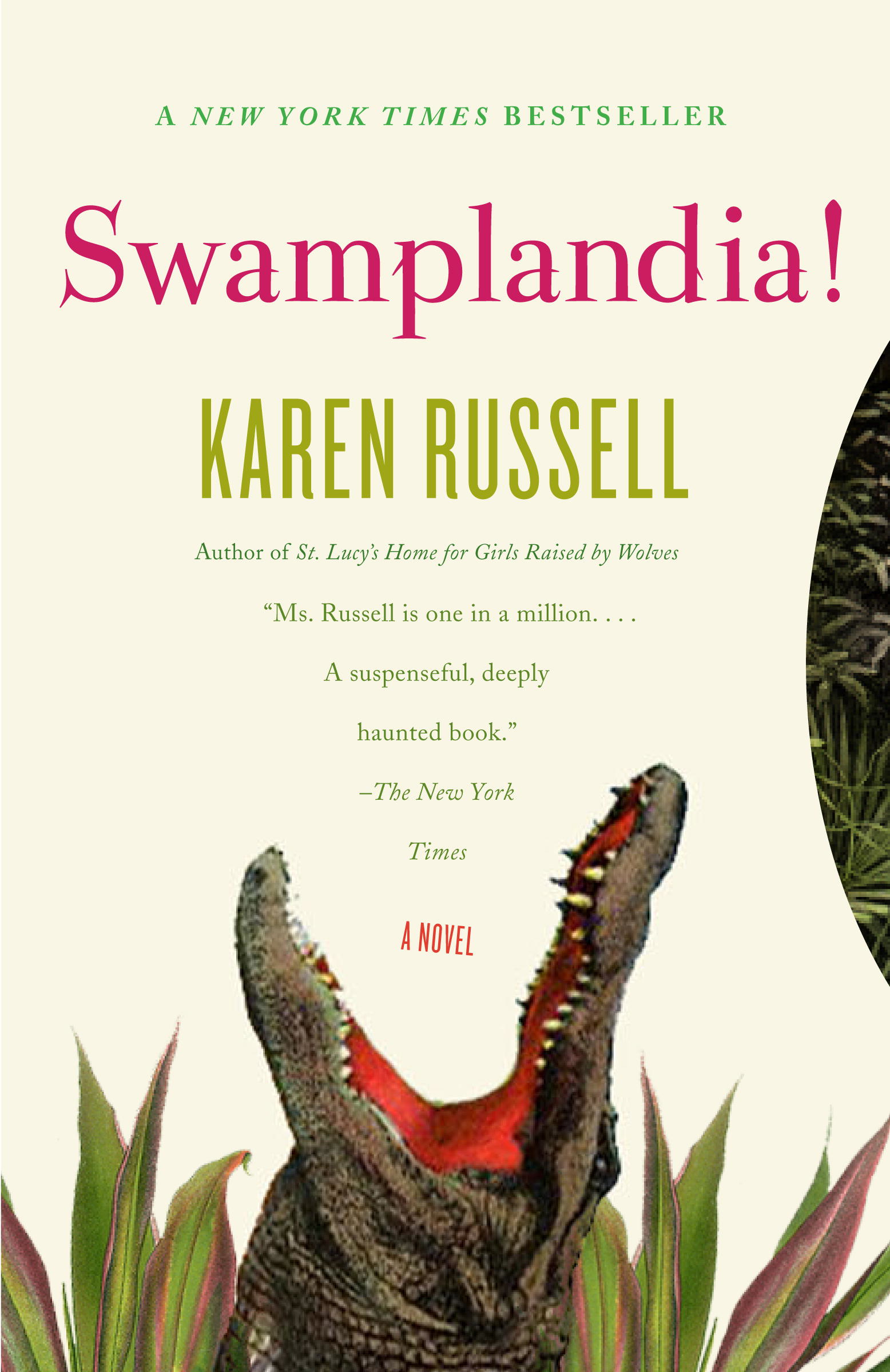In 2012, the Pulitzer Prize fiction jury read over three hundred novels and short story collections and ultimately submitted three finalists to the Pulitzer board, who were to select a winner. Out of THE PALE KING by David Foster Wallace, TRAIN DREAMS by Denis Johnson, and SWAMPLANDIA! by Karen Russell, the prize went to . . . no one. The board’s deliberations are private, so no one will ever know why they decided, instead of choosing the best of three works, to choose none of the above. Of course, many people were shocked and disappointed—myself included. I had read SWAMPLANDIA! that year and thought it was an absolute masterpiece and had been anxiously awaiting the announcement of the prize winner. SWAMPLANDIA! was Russell’s debut novel, published when she was just thirty years old. It is a brilliantly quirky and nightmarish literary novel about coming of age and dealing with profound loss.
SWAMPLANDIA! tells the story of the Bigtree clan, a family of alligator wrestlers running a theme park in the Ten Thousand Islands region of Florida. Their park, Swamplandia!, is in serious trouble: Hilola Bigtree, the family’s matriarch and the park’s headliner, has died of cancer, grandfather Sawtooth Bigtree has been diagnosed with dementia and moved to a senior living facility, the park is in massive debt, and a competing park called the World of Darkness has opened on the mainland and is taking the tourists away. The remaining Bigtrees—father the Chief and children Kiwi, Osceola, and Ava—are devastated and struggling to deal with these losses and save the park. All of the children, as well as the Chief, have grown up on the small, swampy island that houses the park, so allowing Swamplandia! to close would mean not only losing their income, but also losing their unique heritage, their home, and the only way of life they have ever known.
The Chief announces to his children that he has a plan to save the park; it is called Carnival Darwinism and involves purchasing saltwater alligators and revamping their act. The ever-practical and logical eldest child Kiwi clashes with his father on this, suggesting instead that they sell the park and move to the mainland. Eventually, Kiwi leaves for the mainland on his own to seek employment in order to support his family and ironically winds up as a janitor at the World of Darkness. When tourists finally stop coming to Swamplandia! altogether, the Chief closes down the park temporarily and goes to the mainland for a “business trip” of undetermined length to pursue his ideas about Carnival Darwinism. Daughters Osceola and Ava are left alone on the island to fend for themselves. Osceola becomes obsessed with the occult, attempting to contact Hilola via an Ouija board and eventually running off with her “boyfriend,” who she claims is the spirit of a young, dead dredgeman. Left alone, young Ava meets the strange, mysterious Bird Man, who agrees to take her on his pole boat to find her missing sister.
One thing I love about this novel is the motif of duality that runs through the narrative, beginning with the title. The inclusion of the punctuation in the name Swamplandia! says it all—it speaks to the former glory of the park contrasted with the strained enthusiasm and delusions of grandeur of the current day. That exclamation point has a sort of dark irony that hangs over this novel as a whole. The story is told in alternating points of view—first person narration in Ava’s voice and third-person narration that follows Kiwi at the World of Darkness. They are brilliant foils for one another, with Kiwi’s sections representing harsh realism and logic as he is living in the “real world” on the mainland, and Ava’s stunning voice representing her immersion in the fantasy and nightmare of Swamplandia! and the dark happenings on the swamp after the departure of Kiwi and the Chief.
This novel could be placed in a lot of categories: it is a lush Southern gothic, a coming-of-age story, and has even been called magical realism, though technically the only “magic” in the novel (if we take Osceola’s boyfriend to be a delusion, which I do) is Karen Russell’s stunning prose. Her language sparkles—she is an innovative wordsmith, and Ava’s unique ways of describing the world around her are breathtaking. The line pulled out by 2012 Pulitzer juror Michael Cunningham in his editorial on the finalists was “Nights in the swamp were dark and star-lepered—our island was thirty-odd miles from the mainland—and although your naked eye could easily find the ball of Venus and the sapphire hairs of the Pleiades, our mother’s body was just lines, a smudge against the palm trees.” Perfection. Russell also created a sort of mythology and tribal language for the Bigtrees, who are so insular and separated from the world at large. I love the way that they call all of their alligators “Seths”—it makes the gators seem like strange, mythical creatures rather than fat, lazy captive reptiles. The novel is like this throughout: mythical fantasy with grim reality and tragedy underneath.
Admittedly, I have not read the other two nominees for the 2012 Pulitzer Prize for fiction, so I cannot honestly say that of the three of them, I believe SWAMPLANDIA! deserved the prize. But, having read many former Pulitzer winners, I do think I have a feel for the quality, importance, and literary quality that they look for in a novel or short story collection. In my opinion, is SWAMPLANDIA! on par with these winners? Absolutely. Enter SWAMPLANDIA! and decide for yourself—you will not be disappointed.








